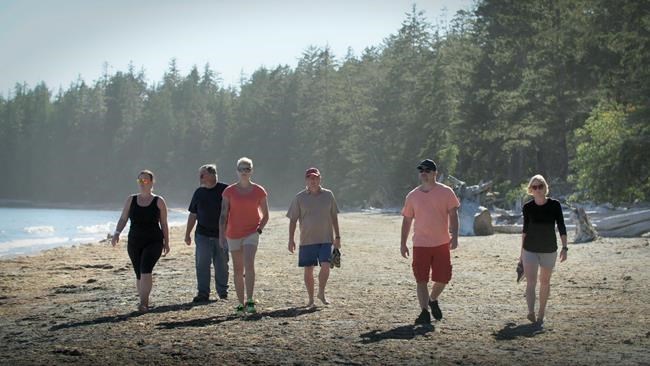
Participants in the new APTN show "First Contact," are shown in a handout photo. A new television show is exploring what happens when you bring six outspoken Canadians into Indigenous homes and communities.THE CANADIAN PRESS/HO-APTN MANDATORY CREDIT
September 10, 2018 - 6:30 AM
WINNIPEG - Talk about a fish out of water story — an accountant from Alberta in a sweat lodge on a reserve, an animal lover from Ontario on an Inuit seal hunt, and a lobster fisherman from New Brunswick eating dinner with a residential school survivor.
A new television show is exploring what happens when you bring six outspoken, non-Indigenous Canadians into Indigenous homes and communities.
APTN's "First Contact," a three-part documentary series, asks what some people really think about Indigenous Canadians. The participants initially respond with stereotypes: alcoholism, drug abuse, flop houses and handouts.
But during the epic 28-day cross-country journey, the group is forced to confront their prejudices head on.
The series, based on an Australian show of the same name, was developed by Animiki See Digital Productions, Indios Productions and Numan Films — the former two are Indigenous-run.
Metis executive producer Vanessa Loewen said it was important to find participants that represent what a lot of Canadians think and bring them into situations where they can actually see what it's like to be Indigenous.
Racism and prejudice are often rooted in a lack of education or human connection to people who are different, she said, and throughout the series there are many hopeful "light bulb" moments.
"You could see the change in some of their perceptions and you could see their willingness to connect with people. You could see stereotypes kind of just started to slowly become replaced with common human experience," she said.
"I hope that the viewer by extension experiences that exposure and education. Those are the things that will tear down the walls that are keeping communities separated."
The series begins with the group in Winnipeg, which has the largest Indigenous population of any major city in Canada. They learn they will be sharing food and staying overnight in an Indigenous family's home — and they are worried.
That quickly disappears when they arrive at Kevin Lamoureux's house. The former education lead for the National Centre for Truth and Reconciliation and associate vice president of Indigenous Affairs at the University of Winnipeg said he was excited for the opportunity.
"One of the consequences of living in a country that is collectively inheriting the wreckage of a broken relationship is that oftentimes Canadians haven't had the opportunity to build relationships with one another across ethnic lines, across cultural lines," he said in an interview.
Lamoureux wasn't shocked by any of the questions or comments that flowed across his dinner table. They were rooted in a simple lack of knowledge, he said, and after sharing stories, everyone quickly found common ground.
"It's amazing what is possible when we can connect on values and really connect as human beings," he said.
There were similar responses from the other Indigenous participants in the show, said executive producer Stephanie Scott, who was raised in Winnipeg and is from the Roseau River Anishinabe First Nation in Manitoba. Despite knowing they were opening their doors to outspoken people, and there was the possibility of a negative encounter, the Indigenous hosts thought it important to share their experiences.
"(The series) brought non-Indigenous Canadians into the Indigenous community. They were taught a little bit about the history, the culture, their food, how they survived a cultural genocide, how they maintain their lives, how they remained strong," she said. "That's what reconciliation is to me."
Narrated by George Stroumboulopoulos, the series showcases stunning environments from Nunavut to northern Ontario to the British Columbia coast. It also delves into a conversation that is sometimes provocative or uncomfortable, but it's a dialogue the executive producers say is important to have in Canada right now.
"If we take those six people and we change one or two of their voices, that's going to create a ripple effect," Scott said.
"That will start another conversation that will be more positive."
The series airs on APTN on Sept. 11, 12 and 13, and will be followed by a two-part reunion special.
News from © The Canadian Press, 2018